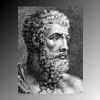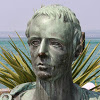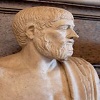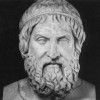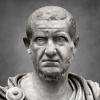
Homer
Homer is the father of poets in the Greco-Roman tradition. We don't know when and if Homer lived, but someone wrote the Iliad and the Odyssey about the Trojan War, and we call him Homer or the so-called Homer. Whatever his real name, he was a great epic poet. Herodotus says Homer lived four centuries earlier. This is not a precise date, but we can date "Homer" to some time following the Greek Dark Age, which was the period after the Trojan War. Homer is described as a blind bard or rhapsode. Ever since, his epic poems have been read and used for various purposes, including teaching about the gods, morality, and great literature. To be educated, a Greek (or Roman) had to know his Homer.
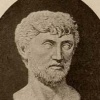
Lucretius Titus
Lucretius Carus (c. 98-55 B.C.) was a Roman Epicurean epic poet who wrote De rerum natura (On the Nature of Things). De rerum natura is an epic, written in 6 books, which explains life and the world in terms of Epicurean principles and the theory of Atomism. Lucretius had a significant influence on western science and has inspired modern philosophers, including Gassendi, Bergson, Spencer, Whitehead, and Teilhard de Chardin, according to the Internet Encyclopedia of Philosophy.

Ovid
Ovid (43 B.C. - A.D. 17) was a prolific Roman poet whose writing influenced Chaucer, Shakespeare, Dante, and Milton. As those men knew, to understand the corpus of Greco-Roman mythology requires familiarity with Ovid's Metamorphoses.

Paul of Tarsus
Paul (or Saul) of Tarsus in Cilicia (d. A.D. 67) set the tone for Christianity, including emphasis on celibacy and theory of divine grace and salvation, as well as eliminating the circumcision requirement. It was Paul who called the New Testament euangelion, 'the gospel'.

